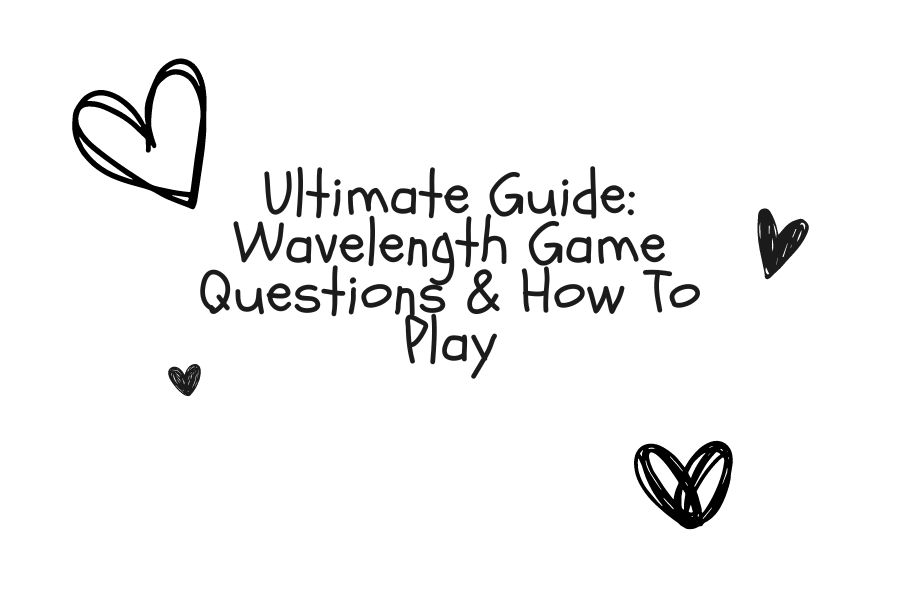Wavelength is a fun social guessing game that gets you and your friends trying to figure out how each other thinks. It’s played in teams. The main idea is to guess how others see different concepts and try to match their thinking. You get a spectrum and need to place a concept somewhere between two extremes. It sounds simple, but it really makes you think and talk a lot about how you see things differently from your friends.
As everyone discusses and explains their views, you have a lot of fun and maybe even learn something new about how we all understand the world. Wavelength is excellent for parties, team-building, or just hanging out with family. It turns a game night into a chance to get a glimpse into each other’s minds.
Challenging 100+ Wavelength Questions to Test Your Friends
Get ready to dive deep with over 100 wavelength questions designed to spark meaningful conversations. Whether you’re with friends or getting to know someone new, these questions will challenge your thinking and bring you closer together. Perfect for any gathering.
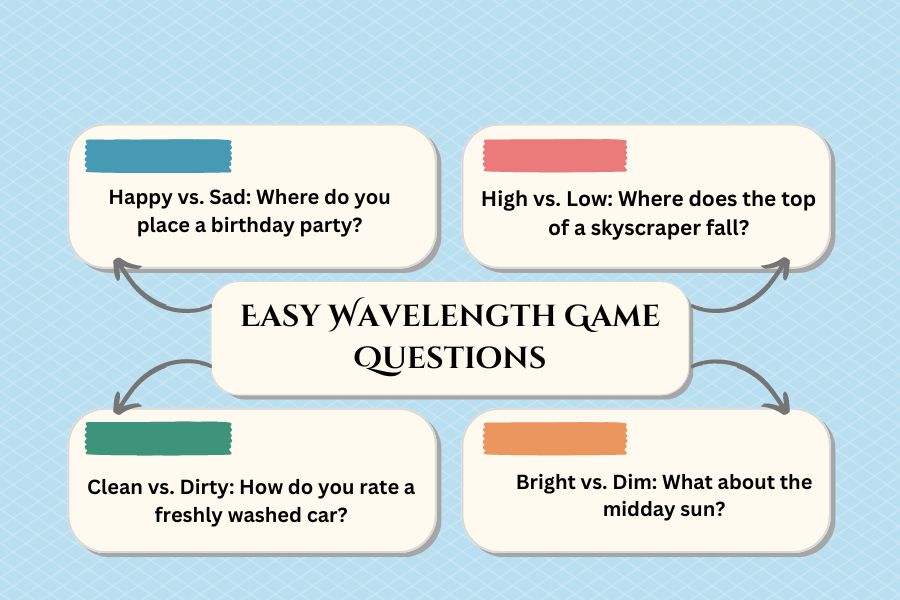
Easy Wavelength Game Questions
- Hot vs. Cold: Where does a summer day fall?
- Light vs. Dark: What about midday?
- Tall vs. Short: Think about a giraffe.
- Heavy vs. Light: Consider a feather.
- Fast vs. Slow: How about a cheetah?
- Happy vs. Sad: Where do you place a birthday party?
- Loud vs. Quiet: Rate a rock concert.
- Hard vs. Soft: How do you rate a marshmallow?
- Big vs. Small: Think about an elephant.
- Sweet vs. Sour: Consider a lemon.
- Bright vs. Dim: What about the midday sun?
- Day vs. Night: Where does noon stand?
- Rich vs. Poor: Think about a billionaire.
- Full vs. Empty: How do you rate a filled glass?
- High vs. Low: Where does the top of a skyscraper fall?
- Smooth vs. Rough: Consider a polished marble.
- Thick vs. Thin: What about a slice of bread?
- Wet vs. Dry: Think about a desert.
- Clean vs. Dirty: How do you rate a freshly washed car?
- Open vs. Closed: Where does an open door fall?
See Also – Top 100+ Peace Of Mind Quotes For Serenity Seekers
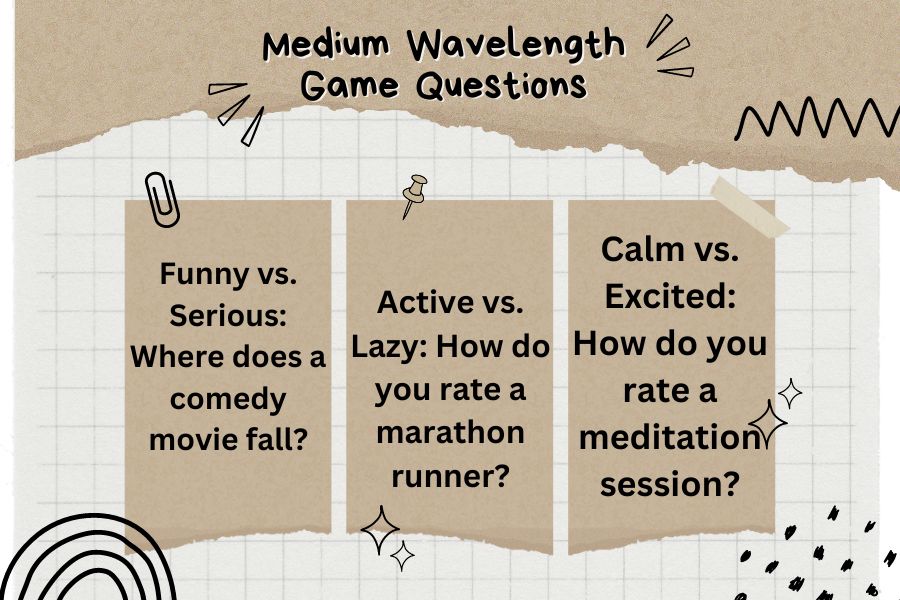
Medium Wavelength Game Questions
- Early vs. Late: Think about dawn.
- Simple vs. Complicated: Rate a jigsaw puzzle.
- Strong vs. Weak: Consider a bodybuilder.
- Brave vs. Cowardly: Where do superheroes fall?
- Calm vs. Excited: How do you rate a meditation session?
- Organized vs. Messy: Think about a neatly arranged bookshelf.
- Clear vs. Foggy: Rate a sunny day.
- Fresh vs. Stale: Consider a loaf of bread straight from the oven.
- Quick vs. Slow: What about a race car?
- Cheap vs. Expensive: How do you rate a diamond ring?
- Bright vs. Dull: Think about a neon sign.
- Friendly vs. Unfriendly: Consider a welcoming hug.
- Generous vs. Stingy: Rate a philanthropist.
- Funny vs. Serious: Where does a comedy movie fall?
- Famous vs. Unknown: Think about a Hollywood actor.
- Active vs. Lazy: How do you rate a marathon runner?
- Delicious vs. Bland: Consider a gourmet meal.
- Attractive vs. Unattractive: Think about a supermodel.
- Healthy vs. Unhealthy: Rate a salad.
- Relaxed vs. Stressed: Where does a spa day fall?
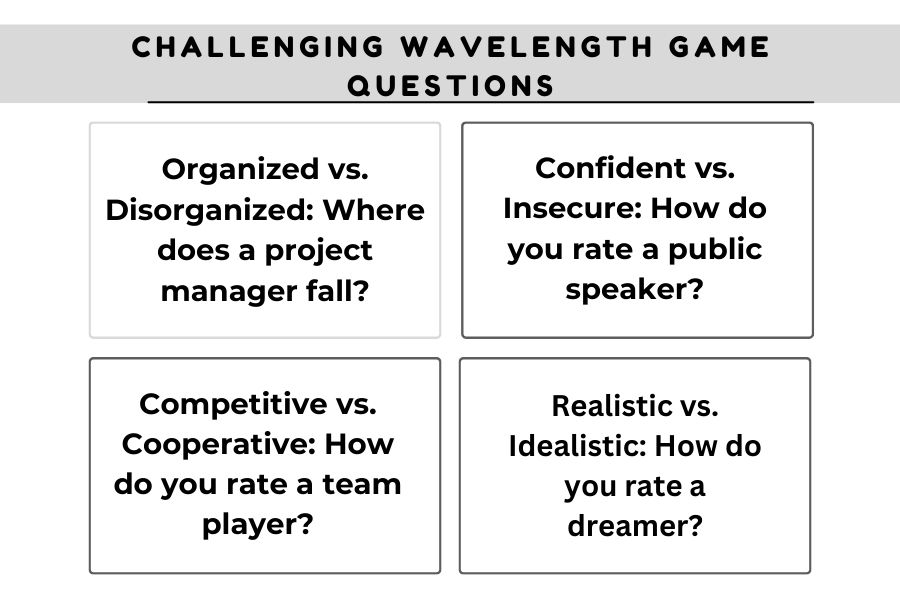
Challenging Wavelength Game Questions
- Optimistic vs. Pessimistic: Where does a motivational speaker fall?
- Introverted vs. Extroverted: Consider a party host.
- Realistic vs. Idealistic: How do you rate a dreamer?
- Traditional vs. Modern: Think about a vintage car.
- Logical vs. Emotional: Rate a computer scientist.
- Creative vs. Analytical: Consider an artist.
- Practical vs. Impractical: Where does a Swiss Army knife fall?
- Intellectual vs. Physical: Think about a chess player.
- Ambitious vs. Content: How do you rate an entrepreneur?
- Loyal vs. Disloyal: Consider a loyal pet.
- Organized vs. Disorganized: Where does a project manager fall?
- Patient vs. Impatient: Think about a long queue.
- Confident vs. Insecure: How do you rate a public speaker?
- Honest vs. Dishonest: Consider a whistleblower.
- Adventurous vs. Cautious: Rate a skydiver.
- Conservative vs. Liberal: Where does a traditionalist fall?
- Skeptical vs. Trusting: Think about a detective.
- Competitive vs. Cooperative: How do you rate a team player?
- Punctual vs. Tardy: Consider a Swiss watch.
- Reserved vs. Outgoing: Where does a public performer fall?
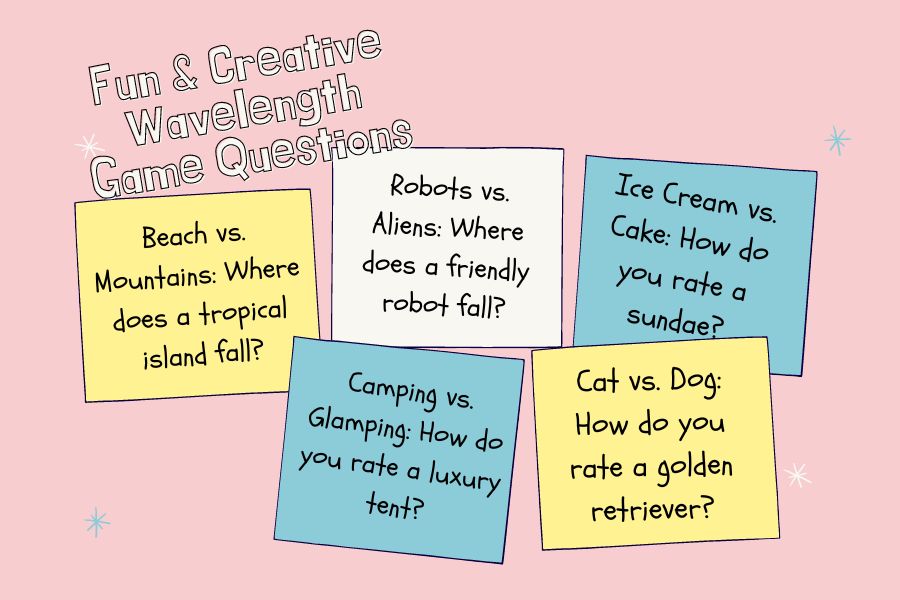
Fun & Creative Wavelength Game Questions
- Unicorn vs. Dragon: Think about a mythical creature.
- Pizza vs. Burger: Rate a slice of pizza.
- Beach vs. Mountains: Where does a tropical island fall?
- Summer vs. Winter: Consider a summer camp.
- Cat vs. Dog: How do you rate a golden retriever?
- Superhero vs. Villain: Think about Batman.
- Chocolate vs. Vanilla: Where does a chocolate bar fall?
- Fairy Tale vs. Sci-Fi: Rate a fairy godmother.
- Movie vs. Book: Consider a blockbuster film.
- Magic vs. Science: How do you rate a wizard?
- Comedy vs. Drama: Think about a stand-up comedian.
- Sunrise vs. Sunset: Where does the first light of dawn fall?
- Pop vs. Rock: Rate a pop star.
- City vs. Country: Consider a metropolitan city.
- Camping vs. Glamping: How do you rate a luxury tent?
- Pirates vs. Ninjas: Think about a pirate ship.
- Robots vs. Aliens: Where does a friendly robot fall?
- Sneakers vs. Heels: Rate a pair of running shoes.
- Ice Cream vs. Cake: How do you rate a sundae?
- Fantasy vs. Reality: Consider a fantasy novel.
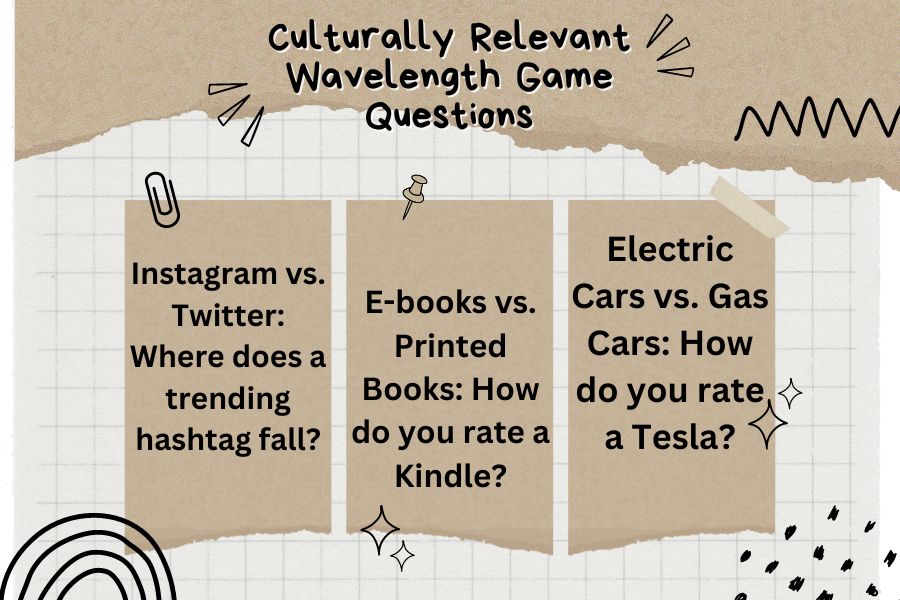
Culturally Relevant Wavelength Game Questions
- TikTok vs. YouTube: How do you rate viral dance challenges?
- Streaming vs. Cable: Consider a Netflix series.
- Smartphone vs. Laptop: Rate a high-end smartphone.
- Instagram vs. Twitter: Where does a trending hashtag fall?
- Facebook vs. Snapchat: Think about Facebook stories.
- Netflix vs. Hulu: Rate a popular Netflix original.
- Online Shopping vs. In-Store Shopping: Consider Amazon.
- Electric Cars vs. Gas Cars: How do you rate a Tesla?
- Home Office vs. Traditional Office: Think about remote work.
- Fast Food vs. Home-Cooked Meal: Consider a fast-food burger.
- Vegan vs. Meat-Eater: How do you rate a veggie burger?
- DIY vs. Professional Service: Think about a home renovation.
- Online Dating vs. Traditional Dating: Consider a dating app.
- Influencer vs. Celebrity: How do you rate a social media influencer?
- Podcasts vs. Radio: Think about a popular podcast.
- Remote Learning vs. Classroom Learning: How do you rate a virtual class?
- Smart Home vs. Traditional Home: Consider smart home devices.
- Cryptocurrency vs. Traditional Currency: Rate Bitcoin.
- Virtual Reality vs. Augmented Reality: Think about a VR headset.
- E-books vs. Printed Books: How do you rate a Kindle?
See Also – 150+ Questions to Ask Before Getting Married for a Strong and Lasting Relationship
How to Play Wavelength
Setting up the game
To kick off a game of Wavelength:
- Gather everyone around the table.
- Make sure you have all the parts: the Wavelength device, a deck of spectrum cards, and scoring tokens.
- Put the Wavelength device in the middle so everyone can see it.
Give the spectrum cards an excellent shuffle to keep things random. Teams should have about the same number of players, but it’s okay if they don’t. Pick someone from each team to give the first clue; they’ll take turns each round. Set the scoring marker at the start of the score track, and you’re ready to go.
How each round works
In Wavelength, the game starts when the clue-giver secretly sets the dial to a specific spot on the spectrum and then hides it. Players split into two teams and take turns having someone be the clue-giver. This role is crucial because they must develop a clever hint connecting abstract ideas to real things.
The clue-giver’s goal is to help their team guess where the dial is pointing. Everyone gets involved in figuring it out, discussing it, debating, and using the clue to make their best guess.
Choosing a target and giving clues
In the game Wavelength, it’s all about picking the right spot on a scale and coming up with an intelligent hint. You’ve got a hidden target somewhere between two extremes, like ‘hot’ and ‘cold.’
If you’re giving the clue, you need to think of something that will point your team exactly where they need to guess. It’s a bit tricky. Your hint can’t be too straightforward or too vague. You want it to be clear enough to get your team thinking in the right direction but not so clear that it gives everything away. It’s about finding that sweet spot where your clue is enough to spark a good chat and get those gears to turn. That’s what makes the game fun and a real brain teaser.
Winning the game
Winning at Wavelength is all about how well a team can understand and match clues to a spectrum between two opposite ideas. The key lies in the psychic’s ability to give clear clues. If the clues are too vague, the team might miss the mark; too detailed, and be misled. Good communication and knowing how your team thinks are crucial. Teams earn points by lining up the scoring marker with the secret spot on the wheel. The team with the most points after several rounds wins. It’s a game where strategy, teamwork, and sharp instincts help you beat the competition.
Conclusion
In summary, Wavelength is a fun game that helps people communicate better. Players give clues and discuss abstract ideas, which sharpens their thinking and social skills. It’s not just about having a good time; it also strengthens friendships and helps people understand different viewpoints. Wavelength is an excellent choice for anyone looking to make their group gatherings more meaningful.
Ryan Dunn has a bunch of certificates on his desk. A few are awards for content production and marketing. Ryan still seeks to achieve. He would like to be a faster runner and higher jumper. He wants to read more books while somehow watching all the Cubs games possible. He would like to produce more written words–though not in this bio.

